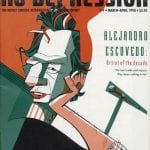Dieselhed – Sorry, they’re not ‘no country’
Dieselhed is a band that can do anything, so they do everything. “We’re constantly battling the threat of eclecticism,” says Danny Heifetz, drummer, trumpet player, and “flat instrument specialist” for the quintet.
Dieselhed’s three albums careen through the whole wide world of American music, from funk to Hawaiian guitar, but always returning to their twin beacons, country and hard rock. The band has been accused of zaniness, but a close listen to their most recent album Shallow Water Blackout on Amarillo Records shows the intelligence that lurks behind even their most seat-of-the-pants musical maneuvers. Produced by Dusty Wakeman, who has engineered for Lucinda Wiliams and Dwight Yoakam, among others, Shallow Water Blackout features sharp lyrical observations and on-a-dime stylistic changes that underscore the tension between the poignancy of everyday life and its downright goofiness.
The members of Dieselhed hooked up nine years ago in rough-and-ready Humboldt County in far northwest California, where they were “trying to attend college,” as Heifetz puts it. They made music briefly at the time, then drifted back together after they all moved to San Francisco. “It wasn’t a real conscious decision to start doing it again. We played in somebody’s kitchen,” remembers Heifetz.
A listen to any of their three releases gives you the feeling they’re in it for the love of twisting musical genres into a new kind of creature. Ultimately, the band’s music is based on folk traditions filtered through their vast record collections, which span the musical universe from Terry Allen to Black Sabbath, 17th-century Irish Revolt Songs to Devo.
“I think we like things that are honest and not showboaty,” says Virgil Shaw, rhythm guitarist and one of the band’s two lead vocalists. “We like a feeling that goes through the music, a modesty.”
Adds Heifetz: “I used to hate country music, mostly out of ignorance. But today I was looking through ‘zines, trying to find places to send our CD, and one said ‘No country.’ I felt I couldn’t send it there, because we are a little bit country. If we just went at it, we’d have a raw, country approach.”
Lead vocalists Shaw and Zach Holtzman lay the songwriting foundations for the band, which then digs in to the songs. “It always starts with Virgil or me coming up with a song at home,” Holtzman explains. “We bring it in, and it’s like talent night. All the sudden everything you wrote seems dumb. Shon [McAlinn, lead guitarist] always says that it’s just like the song we did last week. He sits down and puts his head in his hands and his ears turn red. Then he comes up with something good and turns it into a different song.”
Dieselhed has built a reputation as a formidable live band. Their shows feature a real looseness, a willingness to demolish accepted roles, to trade vocals and instruments and invent new ones. It’s a barndance one minute, lighters in the air the next. “It’s never supposed to be a certain way,” Holtzman says. “It’s fun going up and being yourself. People sense that. It breaks down the walls when people sense you’re floundering around, taking a chance to make something happen.”
Last year, Dieselhed parlayed its live reputation and a shared agent into two tours with sixtysomething guitar god Link Wray, both opening for Wray and backing him up. Chosen over more likely backing bands such as Los Straitjackets and the Mermen, the band is still shaking its head over the tour. “Playing with him is totally great. It’s fun,” says Heifetz. However, he adds, “It wasn’t good for Dieselhed.” The crowds of rockabilly fans dressed in their finest who attended the shows didn’t get their expectations met by Dieselhed’s more experimental sounds, especially in the virgin territory of the East Coast. “We had to barrel through our set. We couldn’t play our quiet songs because it would give people a chance to tell us how much they didn’t like us,” Heifetz recalls.
Dieselhed’s already-completed next album focuses on the band’s rootsier aspects. “Our next CD has a more rounded approach, a more balanced, uniform sound,” Heifetz says. Holtzman characterizes it as “less of a rollercoaster, less thinking.”
The band is label-shopping for stronger support for the record, produced by Tarnation producer Greg Freeman. “Shallow Water Blackout is doing pretty well where it is, but it’s not many places,” comments Heifetz. The band hasn’t yet gotten a deal that will allow them to quit their day jobs, which range from animator to acupuncturist-in-training. In Dieselhed’s five years, sighs Heifetz, “We’ve been teased and taunted by every major label.”




